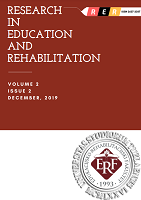THE UNDERSTANDING OF REVERSIBLE SENTENCES IN PERSONS WITH APHASIA
THE UNDERSTANDING OF REVERSIBLE SENTENCES IN PERSONS WITH APHASIA
Author(s): Zamir Mrkonjić, Leila Begić, Samir Smajlović, Mirza SitarevićSubject(s): Applied Linguistics, Neuropsychology, Health and medicine and law
Published by: Edukacijsko-rehabilitacijski fakultet Univerziteta u Tuzli
Keywords: aphasia; abilities of understanding; reversible sentences;
Summary/Abstract: The main goal of this study was to examine and analyze the abilities of the understanding of reversible sentences in persons with aphasia caused by stroke. The study was conducted on a random sample of 25 patients/respondents who had a stroke and who were diagnosed by neurological examination and speech-language therapist examination of a speech and language disorder defined as aphasia. The control group consisted of the same number of respondent, but without aphasia. The assessment of reversible sentences comprehension in patients/respondents was performed using a Reversible Sentences Comprehension Test (Byng and Black, 1999). Analysis of the research results showed that there are significant differences in abilities of understanding reversible sentences between persons with aphasia and those without aphasia. Persons with aphasia have difficulties in understanding reversible sentences. These difficulties can be of varying shape and intensity, from severe to milder interference. Persons with Wernicke’s aphasia suffer from the majority of difficulties and persons with anomic aphasia have the least difficulties.
Journal: Research in Education and Rehabilitation
- Issue Year: 2/2019
- Issue No: 2
- Page Range: 56-68
- Page Count: 13
- Language: English

